
Information regarding the current refugee crisis. Addresses causes for concern and debunks common myths about the refugee program.
- Subject:
- Social Science
- Material Type:
- Lecture
- Lecture Notes
- Reading
- Provider:
- A. Armstrong
- Date Added:
- 03/25/2017

Information regarding the current refugee crisis. Addresses causes for concern and debunks common myths about the refugee program.
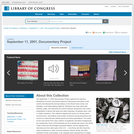
This site captures eyewitness accounts, reactions, and opinions of people in the months after the terrorist attacks on the World Trade Center, the Pentagon, and United Airlines Flight 93. This online presentation includes nearly 200 audio and video interviews, 45 photos and drawings, and 21 written narratives.
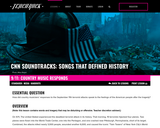
Students will examine the lyrics and context surrounding three country songs related to the 9/11 attacks: Alan Jackson's "Where Were You When the World Stopped Turning?" Brooks and Dunn's "Only in America," and Toby Keith's "Courtesy of the Red, White, and Blue." Through the lens of these songs, they consider ways Americans reacted to the tragedy of September 11th, and discuss whether some reactions might be more appropriate than others.

This course will consider the ways in which technology, broadly defined, has contributed to the building of American society from colonial times to the present. This course has three primary goals: to train students to ask critical questions of both technology and the broader American culture of which it is a part; to provide an historical perspective with which to frame and address such questions; and to encourage students to be neither blind critics of new technologies, nor blind advocates for technologies in general, but thoughtful and educated participants in the democratic process.

Aim is to analyze important current events for what they reveal about the nature and working of our technological world. Starting point is connection between technology and terrorism. Subject also explores how a human-built world can foster insecurity and danger, and how human beings respond. Many invited guests help develop a strong interdisciplinary approach (science, engineering, social science, humanities). Topics include technological risk and remediation, sociotechnical systems, imagination of disaster, technology and identity, technology and religion, technology and education, and technology and trust. Written and oral assignments and a final project required. Service-learning proposals and web-based presentations, in addition to written work, may be considered for the final project by the instructor.
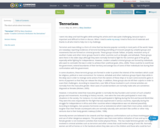
The short article about terrorism
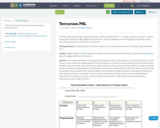
A PBL to help culminate students understanding of global terrorism.

This activity helps students understand the injustice and dangers of scapegoating an entire group of people during a national crisis.
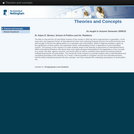
This is a module framework. It can be viewed online or downloaded as a zip file
As taught in Autumn Semester 2009/10
The War on Iraq and the US and British invasion of the country in 2003 has led to huge tensions in geopolitics. At the same time, the supposed ‘threat’ of international terrorism and continuing financial turmoil in the world economy have both brought to the fore the global politics of co-operation and confrontation. Whilst it might be possible to agree on the significance of these events, the explanation and/or understanding of them is dependent on prior theoretical choices.
The purpose of this module is to make students aware of the diversity of approaches to international theory. Within International Relations (IR) theory there exist highly divergent interpretations and applications of key concepts (e.g. power, the state, agency, structure, and world order) as well as contested views about the practical purpose underpinning theories of world politics. The overall aim of the module is to provide students with a solid theoretical and conceptual grounding of this diversity. As a result, it will be possible to recognise not only how international theory informs policy-making and practice but also, perhaps, how truly contested the underlying assumptions of world politics are.
Suitable for Postgraduate Level
Dr Adam D. Morton, School of Politics and International Relations
Dr. Adam D. Morton is Associate Professor of Political Economy within the Centre for the Study of Social and Global Justice (CSSGJ) in the School of Politics and International Relations at the University of Nottingham. His research specialises in the themes of political economy, state theory, historical sociology and development in relation to the making of modern Mexico. His next book is Revolution and State in Modern Mexico: The Political Economy of Uneven Development (Rowman & Littlefield, 2011) and he has published peer-reviewed journal articles on various dimensions of the political economy of Mexico in Third World Quarterly (2003); Bulletin of Latin American Research (2003); New Political Economy (2005); Journal of Peasant Studies (2007); and Latin American Perspectives (2010). He has also published in many of the major peer-reviewed journals in International Relations and International Political Economy (IPE), including European Journal of International Relations (2001); Review of International Political Economy (2003); Review of International Studies (2005); and International Studies Quarterly (2008). Email: Adam.Morton@nottingham.ac.uk
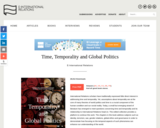
International Relations scholars have traditionally expressed little direct interest in addressing time and temporality. Yet, assumptions about temporality are at the core of many theories of world politics and time is a crucial component of the human condition and our social reality. Today, a small but emerging strand of literature has emerged to meet questions concerning time and temporality and its relationship to International Relations head on. This edited collection provides a platform to continue this work. The chapters in this book address subjects such as identity, terrorism, war, gender relations, global ethics and governance in order to demonstrate how focusing on the temporal aspects of such phenomena can enhance our understanding of the world.
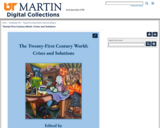
How do you teach world current events? From history textbooks? From the internet? From watching the news? The 21st Century World: Crises and Solutions, aims to remedy a scarcity of comprehensive analysis of world events. It recollects the recent past, analyzes the factors that destabilize and threaten human life, and examines sustainable and fair solutions. The chapters are organized in four parts: sustainability, demographics, literacy, and freedoms. Coverage includes the sustainability of land and water use, poverty-induced issues such as health, hunger, and homelessness, the global economy, population distribution and location, migrations and refugees, education and information and issues of violence that find outlets in oppression, protests, war, and terrorism.

This course is for students who want to know how the dollars we spend on national security relate to military forces, systems, and policy choices, and who wish to develop a personal tool kit for framing and assessing defense policy alternatives.
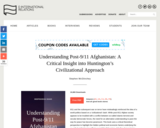
9/11 and the subsequent war on terror have misleadingly reinforced the idea of a world politics based on a ‘civilizational’ clash. While post-9/11 Afghan society appears to be troubled with a conflict between so-called Islamic-terrorist and secular-democratic forces, the need for an alternative understanding to pave the way for peace has become paramount. This book uses a critical theoretical perspective to highlight the hidden political and economic factors underlying the so-called civilizational conflict in post-9/11 Afghanistan. It further demonstrates how a post-Islamic humanist discourse has the potential to not only carve the way for peace amidst dangerous entanglement between politics and religion in post-9/11 Afghanistan, but also vindicate Islam of its unjustified denigration in the contemporary world.

This lesson plan is about racial violence in the Postbellum American South. It includes essential questions, objectives, and assessment parameters.

This course is a general overview of the recent political science literature on violent non-state actors. Its aim is to examine why non-state actors (such as warlords, terrorists, militias, etc.) resort to violence, what means and tactics they use, and what can be done to counter that violence. In that regard, the class will cover works pertaining to the production side of non-state violence (i.e. the objectives and organization of insurgents/terrorists/militias/warlords, their mobilization strategies and support base, how they coerce opponents, etc.); as well as the response that violence elicits from governments or other actors (i.e. counter-insurgency or counter-terrorism strategies, among others). Apart from introducing the basic variables and theoretical and empirical findings in the literature, this course will also grapple with questions of definition, operationalization of variables, and general methodology relevant to conducting research in this area of violent conflict. Though thematically-driven, this course will also reference cases from the contemporary battlefields of insurgency and terrorism (be it Afghanistan, Iraq, Pakistan, the West Bank and Gaza, Colombia, etc.) as they relate to the pertinent themes.
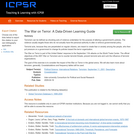
The goal of this exercise is to consider the impact of the War on Terror in the global arena. We will also learn more about terrorism, generally. Crosstabulations and frequency tables will be used.